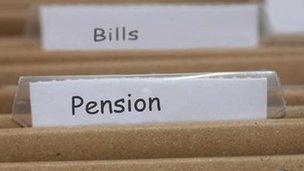Pension planning: When to take a cash lump sum
- Published

There are tax implications when taking a cash lump sum from a pension
It is often possible to take a cash lump sum from a pension plan - on top of, or sometimes instead of, an annual pension.
But which types of pensions allow a cash lump sum to be taken, what amounts are involved, and how much tax might be liable to be paid on it?
Let us start with the state pension. If on reaching your state pension age you delay drawing your pension for at least 12 months you can receive a lump sum in return later on.
You will get back all the pension you have not drawn as a lump sum increased by a rate of interest 2% above the Bank of England base rate.
Even though the lump sum is treated as taxable income in the year it is received, special arrangements apply and tax on it is restricted to the same marginal rate used for your other income. This could be nothing at all if you are a non-taxpayer.
Workplace pensions
Turning to occupational pensions. For most people who retire from work, from a minimum age of 55, the option is usually there to take some of your pension saving as tax-free cash.
In the case of a defined contribution scheme this can be up to 25% of your pension pot.
In a salary related scheme (final or career average salary) the maximum tax free cash is 25% of the deemed capital value of your annual pension - not the pension itself.
The value is calculated as 20 times the annual pension although the rules of your scheme may put a lower limit on the cash you can take, or you might need the trustees to agree that you can take the full 25%.
Some occupational schemes automatically provide for a cash lump sum as well as a pension. Depending on the rules, you may be able to take a higher amount of cash by giving up some of your pension, up to the 25% limit.
Alternatively, you might be allowed to give up some or all of your cash in return for a bigger pension.
Illness
For personal pensions, the rules and options are similar to those of a defined contribution occupational scheme - you can take up to 25% of your pot as tax free cash.

It is possible for some people to take the whole of their pension pot in cash
Although the lump sum payment is tax free, it will not always be the best thing to do.
If you have a reasonable expectation of living for a long period then you are probably better off with a higher pension, even though it is taxable.
Of course, if you have a more immediate need for a lump sum, for example to pay off a mortgage or other large debts, then the cash option may suit you better.
There are some circumstances where you might be able to take the whole of your pension pot in cash - in cases of very serious ill-health, with small pension pots on "triviality" grounds and in certain income drawdown arrangements.
If, sadly, you are so ill that a doctor or other suitably qualified medical practitioner is prepared to give written confirmation that you are expected to die within the following 12 months, then you are permitted to take the whole amount in cash as a special serious ill-health payment. This applies whatever your age and however much or little you have as pension saving.
If you are under 75, no income tax is payable; over 75 there is a 55% charge although this can sometimes be waived in particular circumstances.
Small pension pots
Moving on to small private pensions, you may be able to take relatively small pension savings wholly in cash under an arrangement known as "trivial commutation".
To do this you must be at least 60 years old and the value of your total pension benefits from all sources, excluding state pensions, must not exceed £18,000.
It is also now possible to cash in separately very small pots valued at no more than £2,000 - known as stranded pots.
You can usually take any number of these in cash even if your pension savings elsewhere total more than £18,000 when they are from occupational or public sector schemes. If they are from a personal pension arrangement then they can be similarly cashed in but only on two occasions in any individual's lifetime.
The first 25% of these payments is tax free with the rest added to any other taxable income received in the year.
In relation to income drawdown plans, there is now a new arrangement known as flexible drawdown which will allow some people to draw all the money out in cash from a personal pension plan. The conditions are that you are already receiving a secure pension income of at least £20,000 a year and have finished saving into pensions.
The first 25% of the money in the pot is tax free with the remainder subject to income tax in the normal way.
In any of the situations given here, if you feel you need advice you should consult an independent financial adviser.
<italic>The opinions expressed are those of the author and are not held by the BBC unless specifically stated. The material is for general information only and does not constitute investment, tax, legal or other form of advice. You should not rely on this information to make (or refrain from making) any decisions. Links to external sites are for information only and do not constitute endorsement. Always obtain independent professional advice for your own particular situation.</italic>